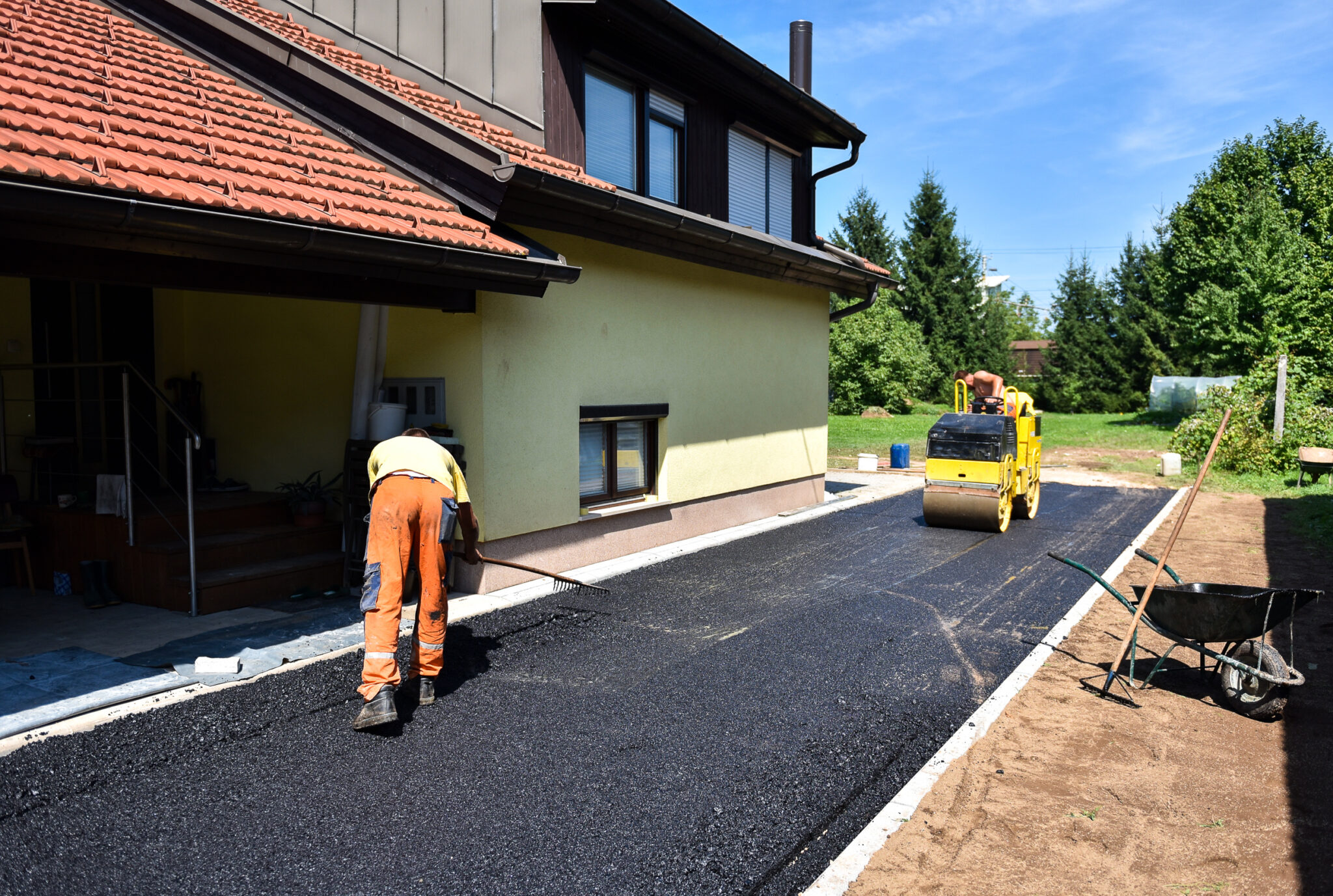Are you considering a new driveway but overwhelmed by the options? Crushed asphalt driveways are gaining popularity as an affordable and eco-friendly solution. But how do they stack up against other materials like traditional asphalt or concrete? More importantly, are they the right choice for your property? This post will walk you through everything you need to know about crushed asphalt driveways – their benefits, potential drawbacks, and whether they’re a good fit for you.
What Is Crushed Asphalt?
Crushed asphalt, also known as recycled asphalt, is made from old asphalt pavement that’s been ground into smaller pieces. This material retains some of the original binding agents, which allows it to compact and form a more stable surface. It is commonly used for driveways, parking lots, and rural roads. It’s a popular choice for homeowners mainly because of its economic and environmental advantage over other materials, although it has other benefits as well.
Pros of Crushed Asphalt Driveways
Cost-Effective
Recycled asphalt is much less expensive than new asphalt or concrete, making it a great option for property owners on a budget. The materials required for crushed asphalt are more readily available and less expensive to source because they’re reclaimed from existing roads and parking lots. Also, the installation process requires fewer resources and is often quicker than traditional asphalt paving.
Eco-Friendly and Sustainable
By recycling asphalt from roads and parking lots, crushed asphalt reduces the demand for new materials and reduces landfill waste. Asphalt is made primarily from oil-based products. This means that reusing existing asphalt helps conserve natural resources and reduce the overall environmental impact. Choosing crushed asphalt for a driveway is a responsible choice that supports recycling efforts and discourages the need for virgin asphalt.
Durability and Strength
Crushed asphalt can be a very durable material if properly maintained and installed. The crushed pieces interlock when compacted to create a stable surface that can withstand traffic. Over time, the surface tends to become even more compact and solid, which increases its resistance to wear and tear. In areas with moderate traffic, crushed asphalt can last several years without major repairs.
Easy to Repair
Crushed asphalt driveways are relatively easy to repair. Unlike concrete or traditional asphalt driveways that may need expensive resurfacing or patching, imperfections in crushed asphalt can be easily fixed by adding more crushed material and compacting it back into place. This process is more user-friendly and budget-friendly for homeowners, as repairs can often be done quickly and at a lower cost.
Permeability and Drainage
The crushed material’s loose, granular texture promotes natural water infiltration that mitigates the risk of water pooling or flooding. This is particularly useful for homeowners in areas with heavy rainfall or where drainage problems are common. The permeability of crushed asphalt helps to prevent erosion and maintain the integrity of the driveway.
Aesthetics
A crushed asphalt driveway appears as a clean surface with a dark, rich color, and it can complement a variety of homes, from modern to rustic. The texture of the crushed asphalt also gives the driveway a more natural and organic look compared to the smoother surface of traditional asphalt or concrete.
While crushed asphalt driveways offer many attractive benefits, there are some considerable downsides as well.
Cons of Crushed Asphalt Driveways
Shorter Lifespan Than Concrete or New Asphalt
While crushed asphalt is durable, it doesn’t always last as long as new asphalt or concrete. The recycled material can begin to break down over time, especially in areas with heavy traffic or extreme weather conditions. The surface may become rutted or loose and require more frequent maintenance. Although crushed asphalt driveways are cost-effective, homeowners should be prepared to invest in regular upkeep.
Potential for Dust and Loose Gravel
One of the drawbacks of crushed asphalt is that it may produce dust or loose gravel when freshly installed. While the material eventually compacts over time and becomes more stable, the driveway can be a bit messy during the initial period after installation. This can be bothersome for homeowners as dust can accumulate on nearby surfaces, including vehicles and plants, and cause issues for those with respiratory problems.
Regular Maintenance Needed
As mentioned earlier, while crushed asphalt driveways are easy to repair, they require regular maintenance to keep them in good condition. Without proper care, the surface can become uneven or eroded. Homeowners should take preventative measures, such as monitoring the driveway’s temperature, to mitigate damages. Maintenance usually comes in the form of replenishing the material or regrading/compacting the surface. Ongoing maintenance costs and time investment are commonplace for crushed asphalt driveways.
Not Ideal for All Environments
While crushed asphalt can work well in many climates, it may not be the best choice for areas with extreme weather conditions. Regions with freezing temperatures or heavy snow can pose a serious threat to the asphalt. In these environments, the material can become brittle or develop cracks that lead to a shorter lifespan. Additionally, if the surface is not properly sealed or maintained, water infiltration during freeze-thaw cycles can cause significant damage.
Can Shift and Settle
The crushed asphalt surface can shift and settle over time, particularly if the installation is not done properly. This can lead to uneven surfaces or loose material in certain areas. Significant settling can be addressed with regular maintenance and regrading.
Weighing these pros and cons is essential when deciding whether this material is best for your home.
Is a Crushed Asphalt Driveway Right for You?
Choosing the right driveway material depends on a variety of factors, including budget, climate, and maintenance preferences. If you live in an area with mild weather and relatively light traffic, crushed asphalt could be a great fit. On the other hand, if you’re looking for a long-lasting, low-maintenance option and are willing to invest in higher upfront costs, traditional asphalt or concrete may be more suitable. Think about whether the look of crushed asphalt fits your home’s design and how much time you are willing to spend maintaining the driveway.
Maintaining Your Crushed Asphalt Driveway
To extend the life of your crushed asphalt driveway, it’s important to keep up with regular maintenance. Here are some tips for keeping your driveway in great shape:
- Regular Compaction: Make sure your driveway is compacted periodically to maintain stability and prevent loose gravel.
- Regular Inspection: Inspect your driveway regularly to keep it clean of debris and oil spills, and keep an eye out for any cracks or structural issues.
- Fill Potholes and Cracks Early: If you notice issues like potholes or cracks, address them as soon as possible to prevent further damage.
- Replenish Material: The crushed asphalt may wear down over the years, so it’s important to add more material to areas that have become thin or damaged.
- Regrading: Regrade the driveway regularly to ensure that it remains level and drains properly.
By following these tips, you’ll be able to extend the lifespan of your driveway and keep it in top-notch shape.
Superior Asphalt is Here to Help Maintain Crushed Asphalt Driveways
Crushed asphalt driveways offer an excellent balance of affordability, durability, and environmental sustainability, making them a great option for many property owners. However, like any material, they require proper installation and regular maintenance. At Superior Asphalt, we offer high-quality maintenance and repair services for crushed asphalt, helping you keep your surfaces looking like new. Whether it’s addressing small issues before they become big problems or being proactive with preventative maintenance, our team of experts has you covered. Contact us today for a property-specific quote!


